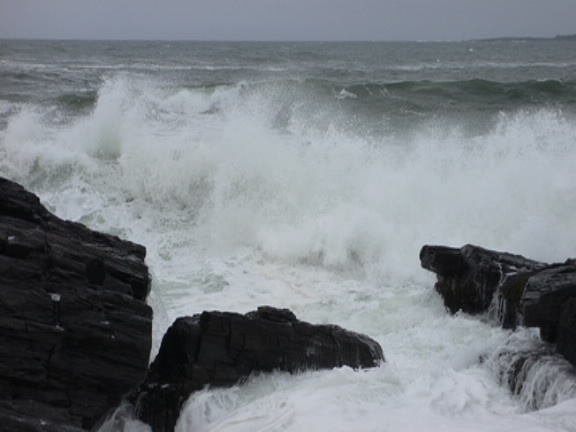SCARBOROUGH — We know a lot about Winslow Homer and the life he led at his studio at Prouts Neck.
From archaeological digs, we know how the artist ate. From his receipts, we know how he liked to dress. From his library, we know what he liked to read. And from his wondrous oil paintings and watercolors, we know what and where he liked to paint.
We can assume he spent a lot of time thinking about the weather. Certainly, the seascapes he painted while in residence at the studio from 1883 until his death in 1910 reflected the weather he dealt with on a recurring basis — and not just the storms that roiled the sea and created drama in his canvases.
We know he enjoyed the sunlight quite a bit too, and that he liked to hang his paintings from the sea-facing veranda of his studio to hasten their drying.
But Homer did not have access to weather.com, and there were no TV weathermen to tell him which way the wind was going to blow.
He learned to read the weather based on his experiences, observations and instincts.
Last week, the Portland Museum of Art, which owns and interprets the Homer studio, hosted the first in its biennial residency program associated with the Homer studio.
The Cannon Rock Sessions brings together two “visiting minds” for a week-long residency to think about and discuss a range of topics. The sessions are named after the outcropping at Prouts Neck that Homer captured in a painting from 1895.
This year’s theme was the weather, and the guest intellects were Don Perkins, president and CEO of the Gulf of Maine Research Institute, and Maine artist Anna Hepler, who lives in Eastport.
A goal of the residency is simply to create a conversation. What better topic to talk about than the weather?
“Each session, we will pick a topic rooted in Winslow Homer’s work and life at the studio that has contemporary implications,” said Dana Baldwin, the museum’s director of learning and interpretation. “We invite two people from two different disciplines who are united by a theme. Their only task is to think about the topic and what that means in their discipline.”
Ideally, Hepler and Perkins would come away from the sessions inspired to think differently about their work as it relates to the weather, and their thinking would create ripples in their larger communities.
The sessions were held at the Black Point Inn, just around the corner from the studio. Each day of the session, Hepler and Perkins engaged a small group of participants to expand their conversation. The residency concluded with a public session Thursday night at the museum.
It sounds very high-minded and esoteric. Who has the luxury these days to sit around the table for the better part of a week to talk about the weather?
But really, it’s not high-minded at all. It’s actually very progressive thinking, and it stems from lessons Baldwin learned when she attended the Getty Research Institute’s Guest Scholar Program in 2005.
One possible result of the sessions will be to influence future museum programs involving the studio.
In our time of instant electronic communication, it’s a wonderful thing to bring a group of people together, face to face, to have a conversation that doesn’t feel like an outcome-based meeting.
And as Baldwin noted, it’s not a novel concept. The idea of convening people like this is very 19th century, and likely something Homer would have done before he opted for relative isolation on Prouts Neck.
It’s also noteworthy that this is a not an art-based idea. Yes, Hepler is a visual artist, but future participants likely will represent a variety of creative disciplines.
Hepler and Perkins, an artist and a scientist, were chosen for the inaugural session because they make a great team, are curious and think about their professions broadly.
Both are articulate and thoughtful, and both are creative problem solvers.
As different as they are in their professions, they are similar in their approach to their lives and work.
At the outset of the program, Hepler sounded both enthused and a bit uncertain.
“It’s totally experimental,” she said. “We have no idea what’s going to happen.”
She likes the topic of weather, because weather both unites and isolates people. When severe weather hits, we realize how insignificant we really are, and how little control we have over our lives and our surroundings.
It’s important that we realize we are not in control, and that there are greater forces at play that dictate the outcome of our lives at any given moment.
Weather humbles us, Hepler said, and strips us of our power.
“Only then can you be honest with yourself in life,” she said.
Staff Writer Bob Keyes can be contacted at 791-6457 or:
bkeyes@pressherald.com
Twitter: pphkeyes
Send questions/comments to the editors.




Success. Please wait for the page to reload. If the page does not reload within 5 seconds, please refresh the page.
Enter your email and password to access comments.
Hi, to comment on stories you must . This profile is in addition to your subscription and website login.
Already have a commenting profile? .
Invalid username/password.
Please check your email to confirm and complete your registration.
Only subscribers are eligible to post comments. Please subscribe or login first for digital access. Here’s why.
Use the form below to reset your password. When you've submitted your account email, we will send an email with a reset code.